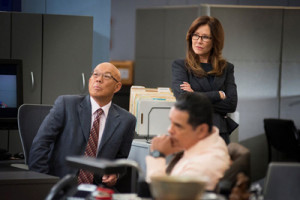Tweet
 In a new interview with Slate.com, Mary McDonnell talks about navigating the transition from The Closer to Major Crimes, and how she approached playing a character who audiences loved-to-hat.
In a new interview with Slate.com, Mary McDonnell talks about navigating the transition from The Closer to Major Crimes, and how she approached playing a character who audiences loved-to-hat.
Slate: Your character, Sharon Raydor, was introduced in The Closer as an antagonist for Kyra Sedgwick’s Brenda Leigh Johnson. Pretty much everyone resented Raydor’s presence. How did you turn a character whose main characteristic was that she was annoying into someone who the other characters respect and viewers would want to spend time with?
McDonnell: If people were asked or manipulated into having to like Sharon Raydor, it would have flopped. If the viewer and the other characters are experiencing her doing a job as well as she can, and through that she begins to expose other aspects of herself that may shift the way they feel about her, then we’re succeeding. Sharon Raydor had enough strength to overcome the need to try to make people like her. And it was in that resistance that people started to accept her and then grow fond of her, because she wasn’t asking them to change.
Slate: As an actor, are you aware of the likability, or lack thereof, of your character. Is that something that concerns you?
McDonnell: When Sharon Raydor was first on The Closer, I had a double experience. There was a part of me that found it very difficult to be the character that nobody likes. But then I would have so much fun with it in the world, I remember one time I was getting off the New York State freeway, and the lady in the tollbooth recognized me and went ballistic. She said: “Girl, I hate you! I’m so glad you’re on that show; you are so much fun!” And that was the kind of energy I was getting from people. They were loving being annoyed with her. That was a very fun dynamic. It was almost hard to lose that.
Slate: One of the aspects of Major Crimes that I really enjoy is Raydor’s relationship with Rusty, a kid who has had a hard life. He was a teenage hustler and a witness to a serious crime. Raydor’s interactions with him really bring out a mood that is often present in the parts you play, a hard-on-the-outside, soft-on-the-inside quality.
McDonnell: Yes.
Slate: Is that the kind of mood that you’re conscious of trying to project?
McDonnell: I think it’s something people see in me and hire me for. I think we all carry something, and sometimes it is for whatever reason needed in the marketplace of entertainment. And then the job is not to try and make it different for the sake of being different but to try and find what is very specifically unique about the character through which these qualities are being manifest. Sharon Raydor has got things going for her that I’ve never played before—and yet she has a core energy that I understand well.
Read the entire interview here
